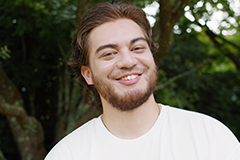Ella Rea-Rankin

Lived Experience Support Practitioner, Gold Coast
Bachelor of Arts in Psychology, with a minor in Children and Learning
She had a particular interest in developing her knowledge of child psychology, says Ella Rea-Rankin who completed a Bachelor of Arts in Psychology, with a minor in Children and Learning.
“Psychology is a complex and fascinating topic I’ve always had a deep interest in. I was drawn to studying the subject as I wanted to learn more about human behaviour and emotions and understand what causes us to perceive and respond to situations differently. I was eager to expand my knowledge of psychological theory, particularly in the fields of psychopathology, social and developmental psychology.
“I’d recommend the Bachelor of Arts to others as it offers a broad range of topics you can study within psychology, and there’s a great range of minors that can complement your study and future career goals. For me, being able to major in psychology and minor in children and learning helped make my final decision to study at AUT. I believe that having a strong understanding of child psychology is highly important, and I felt that the two topics aligned with my career goals and would complement each other well.”
Now living and working on the Gold Coast, she loves her career as a lived experience support practitioner.
“My role blends several support streams, so clients can get exactly what they need, when they need it; bridging the gap between therapy and everyday life.”
Supportive and inspiring
AUT is a great environment to study in, says Ella who completed her degree at the end of 2023.
“When I was deciding where to study, I was drawn to the welcoming nature of AUT and the range of student services that were available. I found AUT to be supportive and welcoming. The transition from high school to university was a change of pace – taking control of my learning, developing a routine and learning new systems was overwhelming at first. However, AUT has great resources, workshops and student support available to make this transition to university easier.”
She was impressed by the academic staff she met throughout her studies.
“The lecturers are experts in their fields, and always open to helping students and answering questions. One lecturer in particular, Dr Amy Kercher, sparked my passion in the area of child psychology. She spoke with such passion about the importance of early intervention, and how what we learn and experience as children can shape who we are as adults. It made me realise that this is an area I wanted to learn more about and hopefully contribute to one day.”
Advice for other students
Ella’s advice for other students is simple: study what you’re passionate about.
“When you have a genuine interest and passion for what you’re studying, you absorb information and everything encompassing your degree becomes enjoyable. You want to put time into it, learn more and further your understanding of what you’re studying. It makes spending hours doing assignments so much easier when you’re eager to learn and deepen your understanding of the topics.”
Staying organised is also really important, she adds.
“I’ve found it really helpful to use a diary to plan how to approach the workload and to set my own deadlines for assignments before the actual due date. The more you put into your study, the more you get out, and staying organised and having a plan reduces stress and helps you feel on top of everything.”



